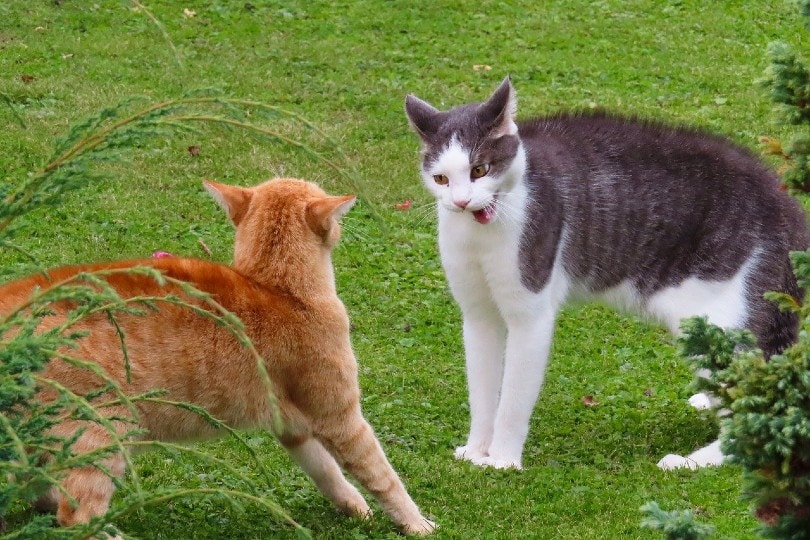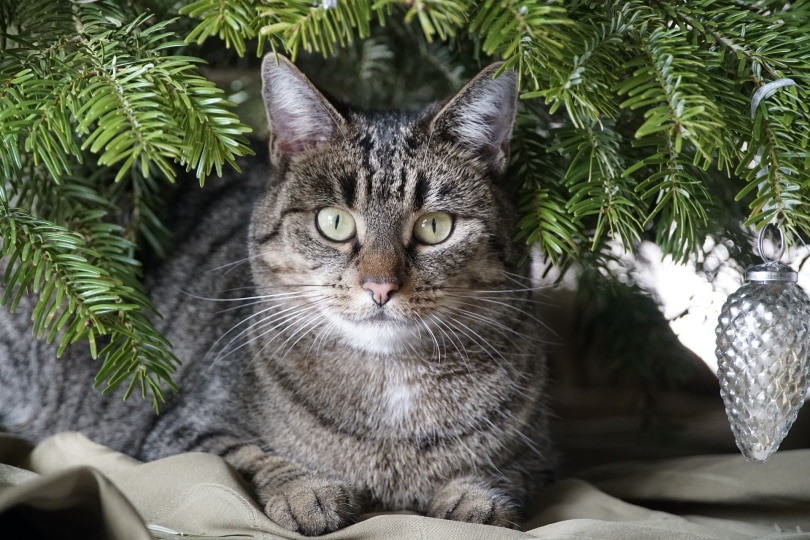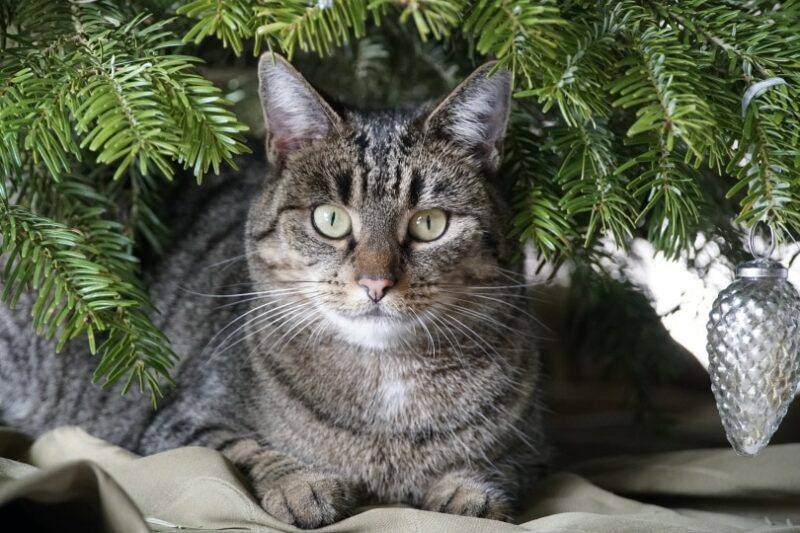Have you ever wondered if cats live longer than dogs, and if so, why? Here’s the short answer: Cats typically have longer lifespans than dogs. The average dog lives for anywhere from 8–11 years, depending on the animal’s weight.
Larger dogs usually have shorter lifespans than smaller dogs. On the other hand, the average indoor cat lives anywhere from 10–15 years. Cats’ lives are, on average, 25% longer than their canine counterparts. But have you ever wondered why? Read on for six reasons why cats live longer than dogs.

The 6 Common Reasons Cats Live Longer Than Dogs
1. Cats Are Solitary
One theory suggests that cats live longer lives because they don’t relish the company of other cats. And since cats are solitary creatures that don’t need to work with others to hunt successfully, they don’t regularly come into contact with other cats, reducing the transmission of infectious diseases.
But the theory fails to account for a few feline realities, such as the existence of feral cats who live in colonies and regularly interact with other cats. And most dogs no longer live or hunt in packs. Dogs are, by and large, companion animals who live comfortable lives indoors with a human family.
But cats may well live longer because they don’t come into contact with infectious diseases for a different reason than the theory suggests. It might be more accurate to state that most cats in the United States are kept indoors, which reduces contact with dangerous animals and potential pathogens, increasing overall feline longevity.
2. Cats Have More Weapons
Another theory argues that cats live longer because they have more weapons than dogs, giving cats an evolutionary advantage when it comes to defending themselves and catching prey.
But most domestic cats don’t hunt for dinner anymore! Most receive more than enough nourishment from the cat food their human companions provide, as indicated by the epidemic of feline obesity. And large numbers of cats don’t go outside unsupervised, essentially preventing them from getting into fights, so there’s no real benefit in having superior weapons.
Yet again, the answer might involve the high number of indoor cats in the United States. Cats that don’t have unsupervised access to the outdoors don’t have as many opportunities to get into tangles with other animals or to interact with animals carrying infectious diseases. Feline longevity may have more to do with the fact that most cat owners keep their pets indoors.

3. Cats Haven’t Been Subject to as much Breeding
Cats have been domesticated for roughly 8000 years. But dogs beat cats in the domestication race by millennia. Evidence suggests that dogs were domesticated over 30,000 years ago. Humans have spent ages selectively breeding dogs for color, size, coat length, as well as physical and mental traits.
Just think about the variety in the canine world. Great Danes are members of the same species as toy poodles, suggesting the extent of human-driven trait-selective breeding. And purebred dogs are prone to certain genetic illnesses, including heart disease and neurological disorders, which are the unintended consequences of selective breeding over time.
No such diversity exists among domestic felines. They’ve been subject to selectively breeding for less than 200 years, so the species’ fundamental characteristics haven’t yet been substantially altered. While there are differences between feline breeds regarding temperament and some physical features, there’s little size and weight variance among domestic cats.
4. Purebred Pets Live Shorter Lives
Purebred pets tend to live shorter lives, most likely due to the health impacts of selective breeding. Purebred cats and dogs tend to have more health issues than their mixed brethren. Purebred cats often suffer from genetic issues such as degenerative joint disease, neurological problems, and painful digestive conditions. Purebred dogs are often at increased risk for developing heart, digestive, and skeletal issues.
Purebred dogs often live shorter lives than mixed ones. Purebred dogs have a life expectancy of around 10 years compared to the 14-year average for mixed breeds. Similarly, purebred cats tend to live slightly shorter lives than mixed cats. Purebred cats typically live around 12.5 years, while mixed felines generally make it to 14.
Although purebred felines are becoming increasingly popular, most pet cats in the United States are mixed, increasing overall feline longevity. On the other hand, most dogs in the United States are purebred.

5. Larger Dogs Live Shorter Lives
Smaller dogs tend to outlive older animals. According to American Kennel Club (AKC) data, large dogs typically live around 13.38 years. Medium dogs live slightly longer: 13.86 years on average. And small dogs have relatively long lifespans, with most reaching around 14.95 years. The most popular breeds in the United States tend to be on the larger side. According to the AKC, the most popular species in 2021 were Labrador retrievers, French bulldogs, golden retrievers, and German shepherds, which are all medium-small to medium-large dogs.
Current consumer preferences for medium-large dogs tip the longevity scale in the direction of cats. For a bit of perspective, the most popular small breed, the dachshund, is pretty far down on the popularity list, coming in at 10th place. The second most popular small breed is the miniature schnauzer—number 18 on the AKC’s 2021 most popular breed list.
6. Indoor Cats Live Longer Than Outdoor Cats
Indoor cats live longer than those allowed unsupervised access to the outdoors. Indoor cats usually live anywhere from 10–15 years, while most outdoor cats only survive 2–5 years. And in the United States, most cats are indoor-only or only allowed outside under supervision, increasing the overall average lifespan for all cats.
Outdoor cats face many dangers, including a heightened risk of being injured during fights with other cats and encounters with dangerous wildlife. They also come into contact with parasites like worms and serious infectious diseases such as rabies more often than indoor cats due to their frequent contact with animals like squirrels, skunks, and raccoons.
Outdoor cats are also often car accident victims. Many of these accidents happen close to home, leading many veterinarians to advise against allowing cats unsupervised access to the outdoors.

 Final Thoughts
Final Thoughts
No scientific consensus exists on why cats typically live longer than dogs. But cats usually live 25% longer than their canine buddies, which is likely due to factors such as the high number of indoor cats and the current preference for larger dogs since indoor cats live far longer than those allowed unsupervised outdoor access and larger dogs have shorter lifespans.
The research is quite clear; keeping your cat indoors is one of the most important steps you can take to give your buddy the best shot at a long, happy, and healthy life.
Featured Image Credit: jhenning, Pixabay






